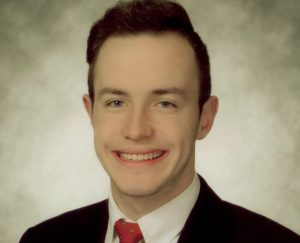When I first learned about intellectual property (“IP”) law, my initial impression was that a large portion of IP involves patents and that patent law was only reserved for former science majors. However, my impression was wrong. In the past year, I learned that IP law is not solely focused on patents and that not every aspect of practicing patent law requires a science background.
Let me explain how I learned that and how Loyola Law played a major role in that story.
My Initial Interest in IP Law
My initial interest in IP law had its roots from my early interest in business law. When I began applying to various law schools, I believed that I would graduate and practice business law. During my undergraduate studies at the University of Dayton, I majored in American Studies with a minor in Business Administration.
As I was applying to different schools, I had to select what areas of law I was most interested in. While I always selected business law, which was tied to my minor in business administration, one area that caught my eye was IP law. In my mind, IP seemed very interconnected with business. Almost all companies have IP that require protection for the sake of guarding an organization’s own creativity and innovation. To me, if I was interested in business law, I thought IP law would be an area worth checking out as well.
Wait, Do I Need a Science Degree?
Until I began participating in prospective IP law student sessions from various law schools, I did not realize that some areas of patent law require a science background. Specifically, I learned that there is something referred to as the “patent bar” that is required for attorney to represent inventors before the U.S. Patent Office to seek patents which is called patent prosecution and that patent bar requires a science background. Although I later learned that attorney that litigate patents in court do not need a science background, I did not know this at the time. Thus, I was initially discouraged.
I did know that IP included other fields besides patents. In particular, I knew it included trademarks which included logos and slogans, as well as copyright. However, these areas of law seemed too minor to have a career that focused on one or the other.
Decisions, Decisions
Now came the time for me to pick which law school to attend. I knew I wanted to go to either DePaul or Loyola My goal was to be back home in Chicago. The pair were the two law schools in Chicago that I knew best. Loyola’s overall reputation and its business law program had me leaning toward Loyola.
Then, I learned more about the school’s IP law program. Loyola made a great demonstration via its information sessions for prospective IP students that their IP law program is open to all kinds of prospective students, both those with a science background and those with no such background. In Professor Ho’s info sessions about the IP program at Loyola, she detailed to prospective students how the so-called “soft IP” of trademarks and copyright had loads of careers available for students with no science background, such as law firms with small IP practices.
Furthermore, the externships that the program provided, ranging from IP law firms to museums, were specifically stated to be available to lawyers without a science background. While other law schools do provide IP opportunities for non-science majors, Loyola’s willingness to talk more about it and to assist non-science majors in finding IP careers really tipped the scales in favor of me choosing Loyola.
IP is Open to All
After enrolling at Loyola, I learned even more reasons why IP is open to me and other non-science majors.
In late November 2020, at the end of my first semester, Professor Ho invited me to observe student presentations from her IP Law class. There, I learned how Professor Ho’s students covered a number of IP issues (patents, trademarks, copyright) in the class and applied that knowledge in a number of different situations.
This past March, in my second semester of law school, I attended an IP networking event. I talked to multiple IP attorneys, including those who did not practice in patent law. I followed up with a couple of the non-patent attorneys who work at Fuksa Khorshid, a firm that focuses on non-patent IP.
I also later had a phone call with a family friend who is an attorney for Norvell IP, a law firm that deals mostly in trademark law. He specifically detailed how Norvell would focus much of their efforts on trademarks and what the practice looks like. He explained that the firm often advises their clients on whether a mark was entitled to legal protection. Also, he explained that just as patent attorneys help obtain patents, trademark attorneys do the same. They also engage in “prosecuting” their clients’ trademarks with the United States Patent and Trademark Office (USPTO).
All of these experiences have helped me learn that IP is a kaleidoscope of many different things. Just like all fields of law, IP law has a variety of subsections that I could go into. The two subsections I am most interested in, trademark and copyright law, do not require a science background. Again, the only area of IP law where such a background is necessary is patent “prosecution” that involves the patent office, but not litigating patents in courts.
Most importantly, trademarks involve what had originally interested me in the area of law: IP’s interconnectedness with business. Trademarks are defined as words, images, and devices that are used on good/services in commerce and that identify and distinguish one good/service from another. Since a trademark is a word, image, or device and must be used in commerce, trademarks are mostly used by businesses in the forms of logos, slogan, or even musical jingles.
These businesses’ trademarks help people to recognize what the source of a certain product is. For example, two connected golden arches on a paper bag help identify a food product as being from McDonald’s. Without these trademarks, a company would have a difficult time in getting the consuming public to recognize a certain product from a particular source. As a result, a company would struggle to gain market share in its line of business.
Time to Get Started
This semester, I am taking an IP law class with Professor Ho. I am learning more about the specifics of trademark and copyright law, as well as patent law. I have also learned that IP includes trade secrets that protect valuable information and that this area also does not require a science background. By doing so, I will have a baseline foundation of knowledge about IP before I start looking for jobs in that field.
With a great amount of help from Loyola, I am optimistic that I can have a successful career in IP, and I cannot wait to see what’s ahead.

Brendan Zdunek
Assistant Blogger
Loyola University Chicago School of Law, J.D. 2023
